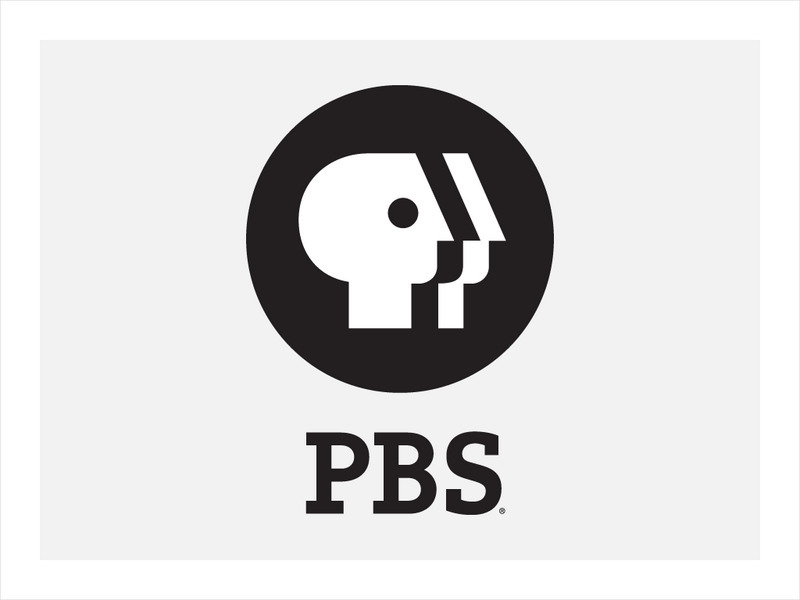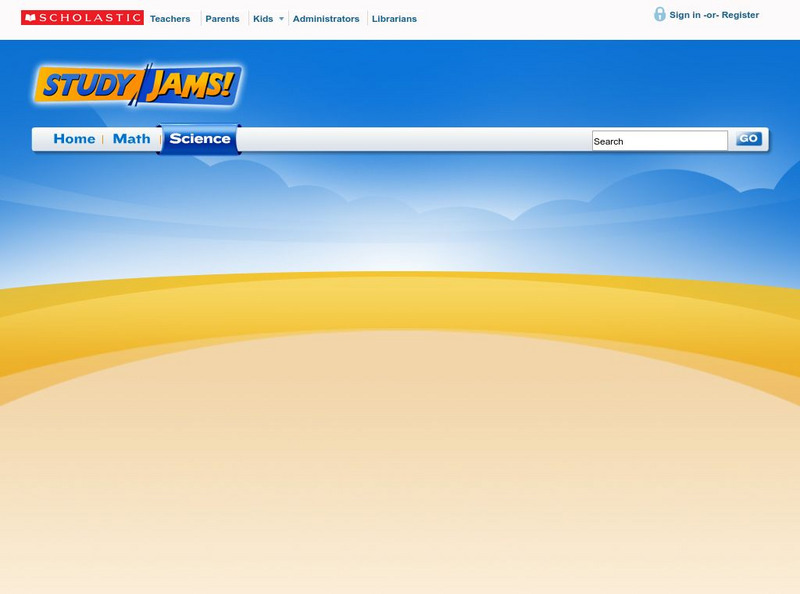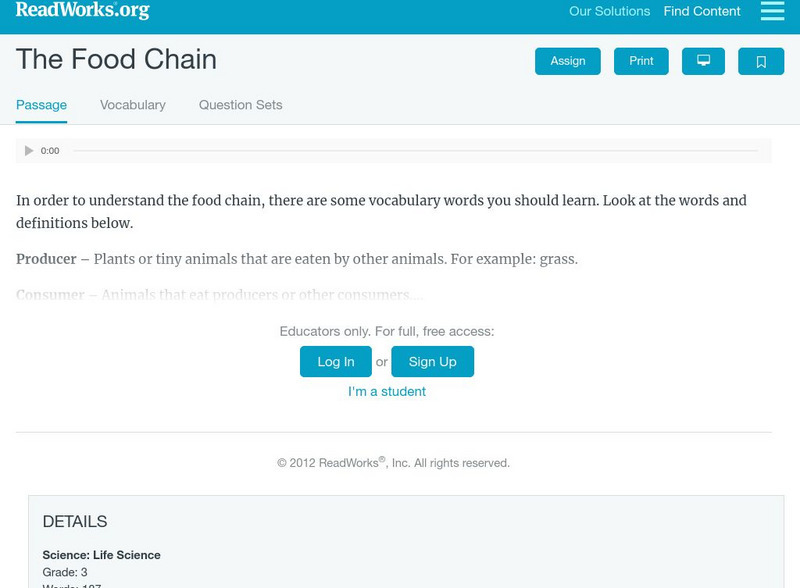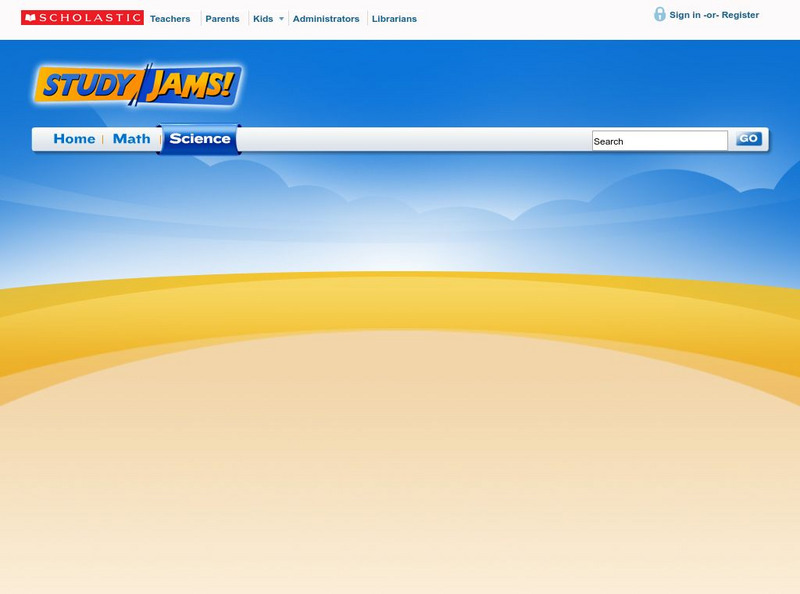Other
Zephyrus: Food Puzzle Chain
Answer these ten interactive questions about ecological feeding relationships by choosing the correct image that completes each food chain.
PBS
Pbs Kids: Don't Buy It: Get Media Smart!: Create a Pop Star
Follow the story line to create a pop star. You must make good financial choices to achieve success. You can also quiz yourself about commercials and other uses of music.
Scholastic
Scholastic: Study Jams! Science: Ecosystems
A video and a short multiple-choice quiz on the topic of ecosystems, covering biotic and abiotic factors, and the roles organisms play in an ecosystem.
Scholastic
Scholastic: Study Jams! Science: Ecosystems: Food Webs
A video and a short multiple-choice quiz on food webs that explains the difference between food webs and food chains, and the relationships that exist between organisms.
Read Works
Read Works: The Food Chain
[Free Registration/Login Required] An informational text explaining important vocabulary involving the food chain. A question sheet is available to help students build skills in reading comprehension.
Scholastic
Scholastic: Study Jams! Science: Ecosystems: Food Chains
A video and a short multiple-choice quiz on food chains that explains how energy flows through the chain, beginning with plants.
Council for Economic Education
Econ Ed Link: When Gas Was a Quarter!
Why do things cost so much more now than they used to? Students will find out about inflation in the United States.
Council for Economic Education
Econ Ed Link: Do I Look Like I'm Made of Money?
One of the most common replies given by parents when their children ask for money is "Do I look like I'm made of Money?" This lesson is designed to educate students about the need for money as a generally accepted medium of exchange. The...
Council for Economic Education
Econ Ed Link: Buy a Bond, James: A Lesson on Us Savings Bonds
This site is extremely informative for teaching children the value of saving money. "You will write a persuasive letter telling why people use savings bonds as a way to save their money."
Project Britain
Primary Homework Help: Food Chains Quiz
Brush up on food chain vocabulary before taking this interactive quiz. Check the box for the correct answers throughout the assessment.
Council for Economic Education
Econ Ed Link: The Best Deal
Learners will learn how to determine 'price per unit' to help make decisions when comparing products.
Council for Economic Education
Econ Ed Link: Costs and Benefits of 'The Three Little Pigs'
Find out what the definition of a cost and a benefit is in terms of the economy when using this site. "When making a decision, students should consider the costs and the benefits of that decision."
Council for Economic Education
Econ Ed Link: Nothing to Buy
This site is a printable lesson that compares the command economy of Soviet Russia with the market economy of present day Russia. Lesson provides tables with data comparing prices within the two systems. Discussion questions are also...
Council for Economic Education
Econ Ed Link: Hawaiian Economics: Barter for Fish & Poi
Use this lesson to learn more about the Hawaiian economics system. Learn how they developed and used this specialized type of money system. "For this lesson, you will learn how specialization and division of labor increased productivity...
Council for Economic Education
Econ Ed Link: Climbing the Savings Mountain
Check out this lesson plan to learn how to develop a savings plan that is right for you.
University of Hawai'i
Hawaii Space Grant College: Edible Rocks
At this site from Hawaii Space Grant College, students learn about various meteorite compositions in this yummy lesson plan. Six specific candies are used to represent meteorite characteristics. Students record their observations in...
Geography 4 kids
Geography4 kids.com: Using Groundwater
Of course humans rely on freshwater for drinking and washing, but we also need it in great quantities to water crops and livestock for the food we consume. Understand the systems in place to purify and store groundwater to do this.
ClassFlow
Class Flow: Economics Vocabulary
[Free Registration/Login Required] This flipchart explains basic economics vocabulary such as producers, consumers, and different kinds of resources; limited, unlimited, natural and human. Student assessment items are included.
Council for Economic Education
Econ Ed Link: Hey Pop!
One of the best sounds and smells is fresh popcorn! At the movies, at the fair, or at home, everyone likes to munch on popcorn. What is your favorite brand? Is the most expensive the best? You will conduct a taste test to find out. You...
Council for Economic Education
Econ Ed Link: If I Ran the Zoo Economics and Literature
Welcome to the Zoo! In this two-day lesson you will use Dr. Seuss' If I Ran The Zoo book to introduce the economic concepts to your learners. You will also get the chance to use actual zoo criteria to help a zoo "choose" new animals.
Council for Economic Education
Econ Ed Link: Us History: Inventors & Entrepreneurs
Students will learn the difference between inventors and entrepreneurs. From talking with adults they will learn some of the benefits inventors and entrepreneurs have provided for society in the last 40 years.
SMART Technologies
Smart: Energy Flow in an Ecosystem
Students learn about Abiotic and Biotic Factors and how they affect the ecosystem in which an animal might live in.
Other
Money Management International: The Berenstain Bears' Trouble With Money
A lesson plan featuring the Berenstain Bears that introduces the concepts of spending, goods, services, income, saving, and interest.
McREL International
Mc Rel: Whelmer #42 Learning Activity: Fire Sandwich
An easy to do activity if you have a Bunsen burner. The activity investigates combustion and heat conductivity. The activity is in lesson plan format that meets NSES standards.
Other popular searches
- Producers and Consumers
- Consumers and Decomposers
- Producers an Consumers
- Producers Consumers
- Corn Consumers
- Teenage Consumers
- Consumers and Advertising
- Consumers Rights
- Critical News Consumers
- Producer and Consumers
- What Makes Us Consumers
- Family and Consumers















